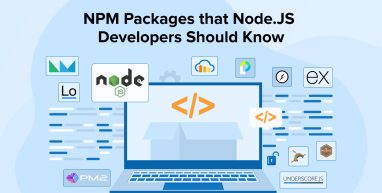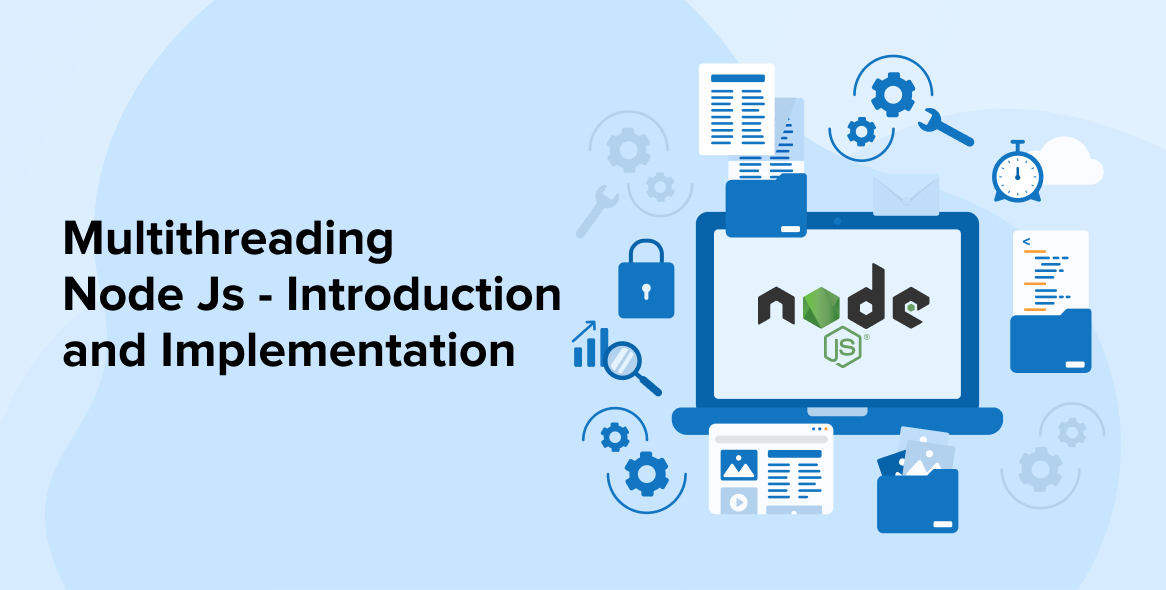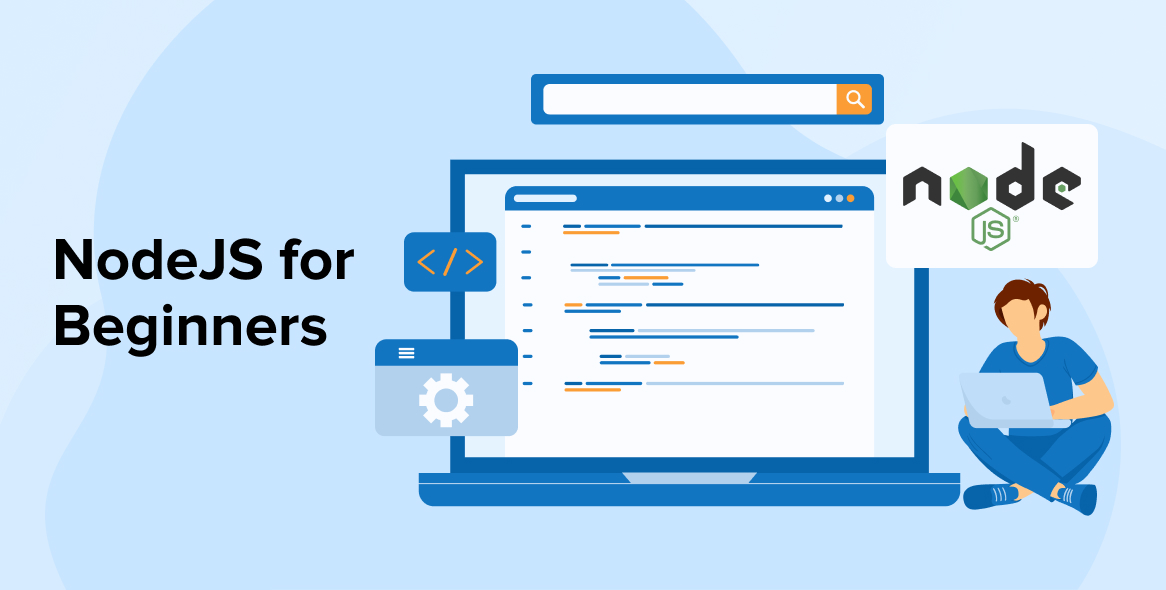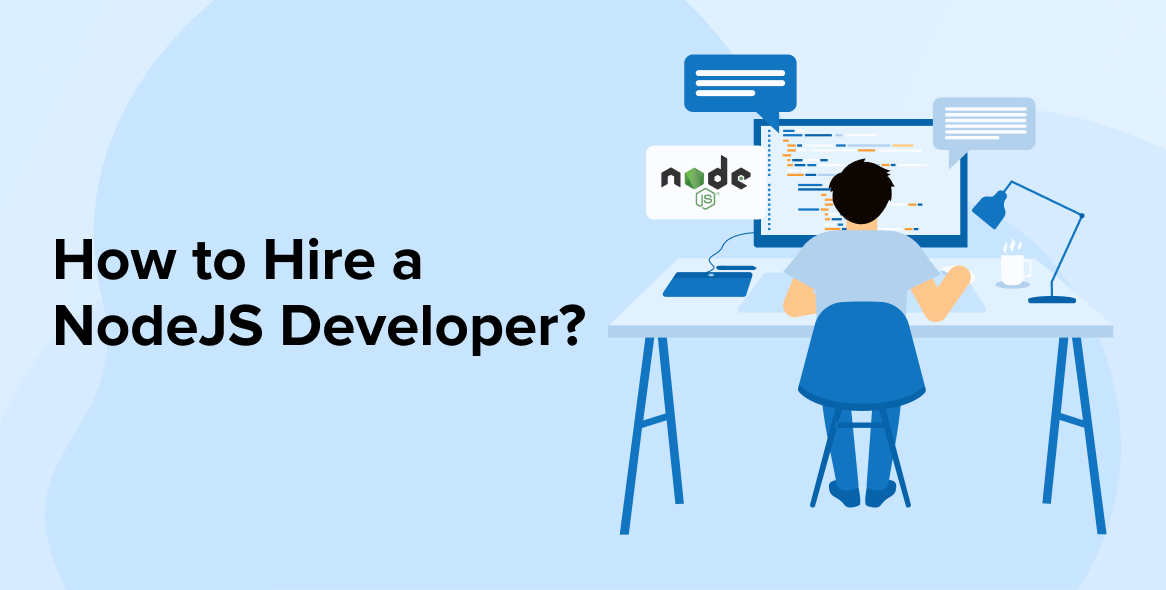
Node is the industry leader for reactive frameworks. Numerous entrepreneurs and enterprises with thousands of millions in annual sales are currently supported using Nodejs development services. Therefore, it defines its position as a platform that can support a tremendous amount of weight without sacrificing performance. One should not overlook that its NPM packages are supported by a huge crowd over any other technology or programming language. Due to the vast array of modules and libraries accessible through NPM registry, constructing a website requires only a few moments. Even complex websites/platforms, like dashboards for statistics, may be completely functional within a few hours.
Node.js was arguably the greatest modern server engineering discovery. Node is not likely to be winding off anytime near, despite appearances. The project maintains historical versions to accommodate outdated systems and continues to issue frequent updates. A new version of OpenSSL closes security flaws and adds language support for C and C++.
Now, sticking to NPM packages, let us roll towards specifications!
1. Useful NPM Packages For Web Development Needs
Now, talking of NPM, it is a default package manager for Node.js. Here, we will go through a list of most installed packages globally to help you shortlist them according to your project needs.
1.1 Express

Express is among the greatest NPM packages since it provides a server foundation for single-page, multi-page, and dynamic web applications. It is the common framework for generating web apps among many engineers.
Moreover, Express is a distinctive option due to its superior capabilities. These characteristics comprise superior efficiency, comprehensive routing, content negotiation, HTTP support, great coverage, and speedier application processing, among others.
With Express, you may build any web application you choose, and its API makes it easy to do so. Express provides a comprehensive overview of how each application is constructed from the beginning. It is one of the finest frameworks or NPM packages currently accessible in the industry.
1.2 Socket.io

You may always use Socket if you intend to construct a real-time communication app that operates with real-time document streaming.
Socket can assist you regardless of whether the material originates from the database you utilize or an API from an independent factor.
Instances of this strategy involve Twitter bots that aggregate the most recent tweets and Facebook bots that consume news. Socket can assist you with various API combinations that utilize real-time information.
1.3 Async

JavaScript has frequently become an obnoxious programming language. With Async.js, you may eliminate superfluous JavaScript elements. The most challenging aspect of JavaScript is the render-blocking part.
The render-blocking feature significantly degrades the effectiveness of a website since it slows page load times.
With an NPM package that includes Async.js, even so, it is simpler to omit such functionalities. With Async.js, dealing with JavaScript gets easier, and the pace of the website rises.
Even though Async.js is designed for Node, it runs flawlessly with all available web browsers. The libraries inside Async.js are vast, with more than 20 functionalities.
1.4 Lodash

Lodash is the one very helpful npm if you’re dealing with a large number of integers, numerals, sequences, etc.
Individuals who consider JavaScript to be a difficult language may also use Lodash. Lodash makes the construction of complicated processes easier.
The nicest aspect of Lodash is that it is accessible in several forms and bundles. Thus, web developers will be able to utilize this one of the best NPM packages with better freedom.
1.5 Underscore

Underscore is well-liked among programmers that want a quicker development approach thanks to technical aids. With even more than 100+ available utilities, Underscore provides a bridge between creating a new HTML page and developing software for it without requiring the user to understand how complicated methods work.
1.6 Cheerio

Do you wish to utilize jQuery on the back-end? Now you can, thanks to Cheerio. Cheerio is a quick, versatile, and lightweight server-specific core implementation of jQuery. Cheerio facilitates the usage of jQuery on the server-side. It is efficient with the command line, flexible and is developed primarily for server use.
1.7 Passport

Passport is a distinctive security module for Node programmers dealing with malicious code. Passport’s primary objective is to assist with authentication queries, which it accomplishes via the usage of third-party modules that serve as authenticating approaches, also referred to as strategies against a malicious package. You provide Passport with a query that requires identification, and Passport provides you with hooks that allow you to manage what occurs when a verification request is successful or fails. Studying the strategies reveals that there are dozens of authentication methods available, ranging from local to external ways such as Google, Facebook, and others.
1.8 Nodemailer

Emailing someone is among the most confidential actions you will perform using an app. Email is extremely important, and having a safe method for conducting email interactions is crucial to your credibility. They developed Nodemailer, an encrypted email management framework for Node.js programs. The manual contains detailed examples for integrating Nodemailer with SMTP.
1.9 Hapi

Hapi is a back-end framework that will gladly help you develop applications and solutions. With Hapi, you can concentrate on creating application code in a succinct manner. Hapi is not only a framework pretender; today’s biggest IT firms depend on Hapi for outstanding performance outcomes. Hapi may also be utilized to develop scalable APIs for high-volume, scalable applications, and it provides a modular architecture that assists in coordinating the project. Freedom is essential in software development, and Hapi provides all the versatility you could want.
1.10 Pug

Previously called Jade, Pug is a node template engine with an outdated website. What exactly is a template engine? Basically, it’s the type of engine that allows you to reduce the requirement to write complicated HTML and JS coding that could otherwise be condensed and simplified. This describes a templating engine. Pug has been designed exclusively for Node, so you’ll receive a number of advantages and familiar themes that will make you more creative and effective at work.
1.11 JSHint

Finding and fixing errors by sifting over code is never enjoyable. It might have a substantial effect on performance and coding style. This is the reason lint removal tools were created. Linting tools allow you to investigate frequent faults and flaws in your program without requiring your whole attention. Rather, the code itself is analyzed by a linter. It provides probable issues and solutions that might significantly enhance your code development.
Every code base grows in size with time, and small errors that were not apparent when they were created can turn into show-stoppers and consume hours of debugging time. At this point, static code analysis techniques assist developers in identifying malicious code issues. JSHint examines a JavaScript application for common errors and probable flaws and notifies them. The potential issue may be a syntax error, a defect caused by accidental type conversion, a property that is leaking, etc.
1.12 Browserify

Dealing with JavaScript libraries may be a challenging endeavor. You must often switch between layouts to determine whether libraries and widgets utilize particular scripts. Ultimately, these scripts get so many that you lose sight of what works for what. As JavaScript advances, the concept that you are only creating web pages disappears. In many respects, web pages designed with JS behave more like applications — adaptable, library-heavy projects that operate separately.
The essential benefit of Browserify is that it enables to construct client-side programming that is tidy, well-structured, and straightforward to explore. Anyone may use Browserify to construct robust modules that swiftly assign dependencies based on its usage in any given circumstance. Node.js projects have a tendency to accumulate packages, modules, and plugins, and Browserify helps in organizing these elements.
1.13 Grunt

You may dodge task launchers for as much as you choose, but knowing one will transform your programming expertise immediately. Using a task runner, you may automate the procedure of conducting minifications, assembling jobs, screening, code linting, etc., for a specific project, hence reducing the number of tasks you need to manage. Grunt provides a multitude of plugins that may be used to automate everything from the most monotonous activities with no additional work on your part. Even if you cannot find a module that delivers the functionality you need, you may publish your version using NPM, as Grunt enables the publication of Grunt-specific plugins.
1.14 PM2

Node.js is a well-known platform for the scalability of huge programs and infrastructure. The control of processes should be a primary concern for any Node.js user. PM2 provides task management for operational environments and a load balancer to facilitate performance improvements. With PM2, your developments will remain available indefinitely, allowing you to reload them without experiencing any interruption. Is it still surprising that dozens of hundreds of Node.js developers regard this as an indispensable tool?
1.15 Mocha

Mocha is a JavaScript test framework, full of features for Node.js and the browser that makes asynchronous testing seamless and enjoyable. Mocha tests are conducted consecutively, allowing for flexible and trustworthy monitoring and fault tracking to the relevant test cases. Testing is essential for determining whether an application performs, locating any specific leaks, and determining how to address the faults, issues, and annoyances that you encounter. Testing enables developers to gain a deeper understanding of how their programming operates and to acquire new abilities as they go along their chosen route.
1.16 Bower

In ancient days, websites consisted mostly of HTML, CSS, and JavaScript. Current websites are nearly impossible to create without extra libraries, plugins, frameworks, and other JS-related services. Regular monitoring of all these services may become a difficult undertaking since there has been so much to regulate and monitor. The existence of package managers like Bower is logical. Bower maintains the JS, CSS, and HTML parts on your behalf. (Fonts and graphic content are also effective!) Bower assigns your packages with consideration and then assists you in keeping them upgraded and periodically scanned for any threats.
1.17 React

React is the most discussed UI framework in current JavaScript blending React with Node.js results in an incredibly quick online application performance. React, which was created by Facebook, enables you to construct scalable interfaces quickly while concentrating on the most critical UI components. The notion that React can run on the pinnacle of any existing technology stack without clashing with external components is what makes it so attractive to programmers.
1.18 Cloudinary

If you seek a service for the graphics in your online application, you should definitely check out Cloudinary. It is a comprehensive cloud service with a multitude of useful features. Just name it, from video downloading to picture scaling and cropping. Without any technologically advanced tools, of course. Cloudinary is very easy to use for both novices and professional developers to maximize its potential.
Owing to the API, Cloudinary may be seamlessly included in any development or application. Consider that you may open a free account and immediately test Cloudinary’s influence and effectiveness. In contrast to installation, setting, and embedding instructions, the official site for the program has further details on its use.
2. Conclusion
This blog presented a collective list of NPM packages to you. This will assist you in identifying the optimal Node.js package for your specific development needs. Sometimes, a well-known Node.js package may not be suitable for your needs, therefore you should select the one that benefits your mission by helping you work in a particular area.
In the end, whichever you choose. it should improve your business, production, adaptability, and security and produce the desired results.






This article provides a detailed explanation of several helpful NPM packages, including Express, Socket.io, Async, Lodash, Underscore, Cheerio, Passport, Grunt, PM2, Mocha, and Bower. Being a node developer, this piece of information helps me choose suitable packages according to my project's needs.
This article is very informative and helps a lot to understand the importance of NPM packages. I now understand that by utilizing NPM packages, we can improve business, production, adaptability, and security while achieving the required outcomes.
This article is very helpful for Node.js developers, offering insights into essential NPM packages that can enhance the development experience and productivity of Node.js projects.
Software packages are a very important tool for any developer. They make our work productive , effective and simpler. This mentioned some of the most essential software packages for node developers. Node developers should read it.